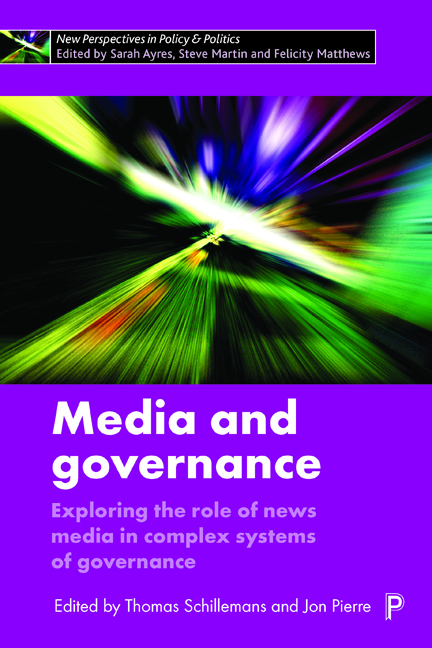Book contents
- Frontmatter
- Contents
- List of figures and tables
- Notes on contributors
- Introduction: Entangling and disentangling governance and the media
- one Governance and the media: exploring the linkages
- two Media and public accountability: typology and research agenda
- three Political control or legitimacy deficit? Bureaucracies’ symbolic responses to bottom-up public pressure
- four Mediatised local government: social media activity and media strategies among local government officials 1989–2010
- five Fighting or fumbling with the beast? The mediatisation of public sector agencies in Australia and the Netherlands
- six The mediatisation of university governance: a theoretical and empirical exploration of some side effects
- seven Managing commercialised media attention in complex governance networks: positive and negative effects on network performance
- eight Over-responsibilised and over-blamed: elected actors in media reporting on network governance. A comparative analysis in eight European metropolitan areas
- Index
five - Fighting or fumbling with the beast? The mediatisation of public sector agencies in Australia and the Netherlands
Published online by Cambridge University Press: 19 April 2022
- Frontmatter
- Contents
- List of figures and tables
- Notes on contributors
- Introduction: Entangling and disentangling governance and the media
- one Governance and the media: exploring the linkages
- two Media and public accountability: typology and research agenda
- three Political control or legitimacy deficit? Bureaucracies’ symbolic responses to bottom-up public pressure
- four Mediatised local government: social media activity and media strategies among local government officials 1989–2010
- five Fighting or fumbling with the beast? The mediatisation of public sector agencies in Australia and the Netherlands
- six The mediatisation of university governance: a theoretical and empirical exploration of some side effects
- seven Managing commercialised media attention in complex governance networks: positive and negative effects on network performance
- eight Over-responsibilised and over-blamed: elected actors in media reporting on network governance. A comparative analysis in eight European metropolitan areas
- Index
Summary
Introduction
In recent years, the ‘mediatisation’ of many parts of the political process have been analysed, as a way of studying the media's influence on politics (see Stromback, 2008; Hjarvard, 2013; Landerer, 2013). ‘Mediatisation’ generally refers to processes of organisational or institutional adaptation to the (news) media. It is a very subtle form of influence, where the media affect the structure or operations of other actors, simply because these have to some degree become dependent on the media and have accordingly adapted themselves to the ‘rules’ and ‘logics’ of the media. As in most political communications research, the gist of these studies focus – quite naturally – on the central actors and defining moments in democracies, such as political parties, presidents, elections and campaigns (Brants and Van Praag, 2006). In addition, however, a new stream of research has evolved that focuses on the mediatisation of public agencies and state bureaucracies (Deacon and Monk, 2001; Maggetti, 2012; Thorbjornsrud et al, 2014). Researching the mediatisation of agencies is relevant, because agencies invest large sums of money in media management (see Cook, 2005), have obtained important political powers in contemporary systems of governance (James and Van Thiel, 2011) and as they are the subjects of around a third of the daily news (Schillemans, 2012).
The initial research focus of mediatisation studies was explicitly normative and the path-breaking studies in the field developed critical analyses of how politics was crucially transformed – if not colonised or mutilated – by mediatisation (Mazzoleni and Schulz, 1999; Meyer, 2002). In more recent years, successful attempts have been made to ‘reconstitute’ mediatisation as an analytical concept with which processes of institutional or organisational transformation can be described (Schulz, 2004; Hjarvard, 2008; Stromback, 2008). However, country comparisons are largely absent from the literature.
Against this background, this chapter will explore the mediatisation of public sector agencies in Australia and the Netherlands with a multimethods research design. The central question is: to what extent have public agencies in Australia and the Netherlands become mediatised? As will be explained below, we will work from the general hypothesis that mediatisation is likely to be more advanced in Australia than in the Netherlands, due to the more competitive and combative political and media systems in Australia.
- Type
- Chapter
- Information
- Media and GovernanceExploring the Role of News Media in Complex Systems of Governance, pp. 101 - 122Publisher: Bristol University PressPrint publication year: 2019

